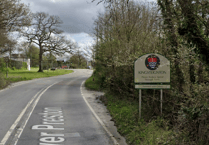This week I am grateful to Graham Lucas for letting me have sight of a photograph of an outing for workers of Candy & Co from the 1950s, writes Steve Harris.
The men look quite dapper in their box ties but where they were going is a mystery. I do not have many names but a member of the KHS recognised Austin Rooke and Harold Coombe from Kingsteignton (third and fifth from the right in the back row).
The firm of Candy & Co had its origin back in the 1870s when Frank Candy founded the Great Western Potteries Brick Tile and Clay Works alongside Chudleigh Road station at Bovey Heathfield.
It was soon manufacturing high quality bricks and tiles. Around 1887, after some financial difficulties, the company passed into the hands of the Fox family who were bankers based in Wellington, Somerset. The Fox family were Quakers and, in the tradition of many Quaker industrialists, built houses and recreational facilities for their workers.
After the acquisition by the Fox family the company grew rapidly. By 1904 the Fox family were looking to increase the company’s ball clay reserves and took over the Devon & Courtenay Clay Company which it ran as a subsidiary.
By 1933 the company was employing 350 men at Heathfield and a further 250 at its subsidiary, Devon & Courtenay.
In the mid-1930s the firm had its own football team, which won the Herald Cup under the name of Heathfield Works.
In 1945 the ball clay assets of the Devon & Courtenay Clay Company were increased when it acquired the Kingsteignton-based Whiteway & Co. An old established firm, Whiteway & Co worked clay at Horsemills and Chudleigh Knighton. Its offices in Broadway Road, Kingsteignton became the new headquarters of the Devon & Courtenay Clay Co Ltd.
In the mid-1960s, in addition to producing tiles, Candy also produced pipes and the state of trade saw it keen to dispose of the pipe-making side of the business.
The company achieved this following some complex negotiations with Watts, Blake, Bearne & Co. The latter purchased the clay-producing Devon & Courtenay business from Candy along with the pipe-making concern. Pipe-making continued under WBB’s ownership until 1970 when it was closed.
The tile-making arm of Candy’s continued under the ownership of the Fox family until 1991.
In 1996 a new company, British Ceramic Tile Ltd, was incorporated and took over the Candy’s works which it redeveloped and installed modern state of the art tile-making equipment. It is now the largest tile making producer in the UK.
I would like to thank Clive Brooks for contacting me with names from the Kingsteignton Secondary Modern School picture which I featured a couple of weeks ago.
For more information on the history of Kingsteignton, visit the KHS website at www.kingsteigntonhistorysociety.com.





Comments
This article has no comments yet. Be the first to leave a comment.